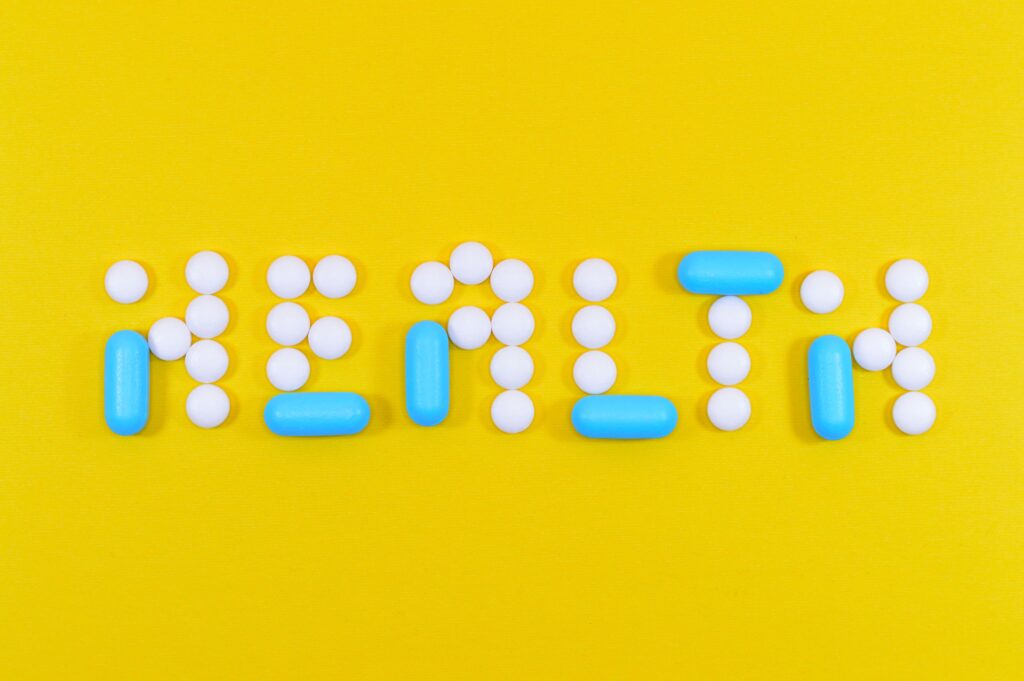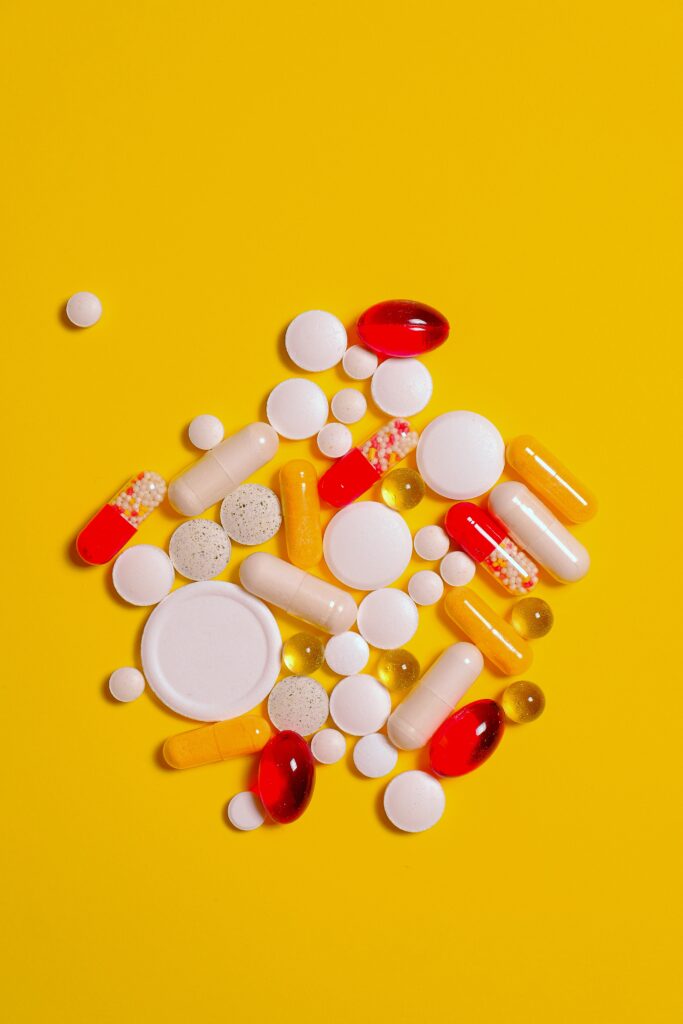7 Best Over The Counter Anxiety Medication
It’s important to consult with a healthcare professional or pharmacist before starting any new medication, including OTC anxiety meds, as they can provide personalized recommendations based on your needs and medical history. Here are seven examples of OTC anxiety medications that are sometimes used:
- L-theanine: An amino acid commonly found in green tea, L-theanine is known for its calming effects and may help reduce anxiety and promote relaxation.
- Passionflower: This herbal supplement has been used for centuries as a natural remedy for anxiety. It may help relieve symptoms such as nervousness and restlessness.
- Valerian root: Valerian root is a popular herbal remedy that can help improve sleep quality and may have mild sedative effects, indirectly reducing anxiety symptoms.
- Melatonin: While primarily known for its role in regulating sleep, melatonin may also have some anxiety-reducing effects. It can help promote relaxation and improve sleep patterns, which may alleviate anxiety symptoms.
- Magnesium: Adequate magnesium levels are crucial for proper brain function. Some research suggests magnesium supplements may help reduce anxiety symptoms in certain individuals.
- Kava: Kava is a plant native to the South Pacific, and its roots are often used to make a calming beverage. Kava supplements may help reduce anxiety and promote relaxation, but it’s important to use them cautiously and consult a healthcare professional due to potential side effects.
- Omega-3 fatty acids: In fatty fish and certain supplements, omega-3 fatty acids have been associated with reduced anxiety symptoms. They can be taken in supplement form or consumed through a balanced diet.
Remember, it is always best to consult with a healthcare professional before starting any new medication or supplement to ensure it is appropriate for your specific situation and to discuss potential risks or interactions with other medications you may be taking.

Skip To:
Learn More:
- High Functioning Anxiety Symptoms, Causes & Treatment
- Alcohol and anxiety, Co-Occurring Disorders, Alcoholism, Symptoms and Anxiety Types & Dual Diagnosis Treatments
- Anxiety Treatment, Therapies, CBT, Medications, Anxiety Disorder Symptoms, Phobia-Related Disorders & Separation Anxiety Disorder
- Co-occurring disorders, Diagnosis, Risk Factors, Mental Health, Substance Abuse & Dual Diagnosis Rehab Washington
- We Level Up WA Mental Health Center
Anxiety Fact Sheet
Anxiety Overview
Your brain and behavior are both impacted by the condition of addiction. Substance addiction makes it unable to resist the impulse to use the drug, regardless of how harmful it may be. The sooner you receive treatment for drug addiction, the better your chances are of avoiding some of the disease’s more serious side effects.
Anxiety Symptoms
Behavioral: hypervigilance, irritability, or restlessness.
Cognitive: lack of concentration, racing thoughts, or unwanted thoughts.
Whole body: fatigue or sweating.
Also common: anxiety, excessive worry, angor animi, fear, insomnia, nausea, palpitations, or trembling.
Anxiety Treatment
- Support group: A place where those pursuing the same disease or objective, such as weight loss or depression, can receive counseling and exchange experiences.
- Cognitive behavioral therapy: A conversation treatment that aims to change the negative attitudes, actions, and feelings connected to psychiatric discomfort.
- Counseling psychology: A subfield of psychology that handles issues with the self that are connected to work, school, family, and social life.
- Anger management: To reduce destructive emotional outbursts, practice mindfulness, coping skills, and trigger avoidance.
- Psychoeducation: Mental health education that also helps individuals feel supported, validated, and empowered
- Family therapy: psychological counseling that improves family communication and conflict resolution.
End the Emotional Pain. Get Your Life Back.
Feeling Depressed, Anxious or Struggling with Mental Health Illness? Get Safe Comfortable Mental Health Dual Diagnosis High-Quality Therapy From Counselors That Care. Begin Your Recovery Now.
Hotline: (509) 348-4077

Anxiety Statistics
It’s critical to understand the distinction between anxiety and depression. Anxiety, in its most basic form, is an excessive feeling of worry, whereas depression, in its most basic form, is an excessive feeling of worthlessness and hopelessness. It is conceivable for someone to experience depression and anxiety simultaneously.
6.8 million
GAD affects 6.8 million adults or 3.1% of the U.S. population, yet only 43.2% receive treatment.
Source: National Institute on Mental Health
10.3 %
19 million adults experience specific phobias, making it America’s most common anxiety disorder.
Source: ADAA, 2020
17.3 million
Major depressive disorder affects approximately 17.3 million American adults, or about 7.1% of the U.S. population aged 18 and older.
Source: National Institute of Mental Health
Get Help. Get Better. Get Your Life Back.
Searching for Accredited Dual Diagnosis Mental Health Centers Near You?
Even if therapy failed previously, or are in the middle of a difficult crisis, we stand ready to support you. Our trusted behavioral health specialists will not give up on you. When you feel ready or just want someone to speak to about counseling alternatives to change your life call us. Even if we cannot assist you, we will lead you to wherever you can get support. There is no obligation. Call our hotline today.
FREE 24/7 Dual Diagnosis Mental Health Services Hotline
Natural Anxiety Medications
Natural anxiety medications, also known as herbal remedies or supplements, can offer several potential benefits for individuals seeking alternative options to manage their anxiety.
These natural remedies often provide a holistic approach to anxiety relief, focusing on the mind-body connection and promoting overall well-being. Here are some of the benefits associated with natural anxiety medications:
- Fewer side effects: Natural anxiety medications generally have fewer reported side effects than prescription medications. This can be particularly beneficial for individuals who are sensitive to or prefer to avoid pharmaceutical drugs.
- Gentle and non-addictive: Many natural anxiety medications are considered gentle and non-addictive. They support the body’s natural processes and promote balance without causing dependence or withdrawal symptoms.
- Calming effects: Natural remedies such as chamomile, lavender, and lemon balm are known for their calming properties. They can help reduce feelings of stress, restlessness, and nervousness, promoting relaxation and a sense of tranquility.
- Support for overall well-being: Natural anxiety medications often have additional health benefits beyond anxiety relief. For example, certain herbal supplements like passionflower and valerian root may also aid in improving sleep quality, which can positively impact overall mental health.
- Holistic approach: Natural anxiety medications often take a holistic approach, addressing the symptoms and underlying factors contributing to anxiety. This may include promoting healthy sleep, reducing inflammation, and supporting overall emotional well-being.
- Accessibility and self-care: Natural anxiety medications can be easily obtained over the counter or through natural health stores. This accessibility allows individuals to participate in self-care and explore different options for managing anxiety symptoms.
Natural anxiety medications may not work the same way for everyone, and their effectiveness can vary. Additionally, it’s crucial to consult with a healthcare professional before starting any new natural remedy, especially if you have underlying health conditions, are taking medications, or are pregnant or breastfeeding. Your healthcare provider can guide the appropriateness and potential interactions of natural anxiety medications for your situation.
What Are The Most Common Anxiety Medications?
Several different classes of medications are commonly prescribed for treating anxiety disorders. Here are some of the most common types of anxiety medications and an anti anxiety medication list:
- Selective Serotonin Reuptake Inhibitors (SSRIs): SSRIs are a class of antidepressant medications commonly prescribed for anxiety disorders. Examples include sertraline (Zoloft), fluoxetine (Prozac), and escitalopram (Lexapro). SSRIs work by increasing the availability of serotonin in the brain, which can help improve mood and reduce anxiety symptoms.
- Benzodiazepines: Benzodiazepines are a class of sedative medications prescribed for short-term relief of severe anxiety symptoms. They enhance the activity of a neurotransmitter called gamma-aminobutyric acid (GABA), calming the brain. Examples include alprazolam (Xanax), lorazepam (Ativan), and diazepam (Valium). Benzodiazepines are typically used short-term due to the risk of dependence and the potential abuse.
- Buspirone: Buspirone is an anti-anxiety medication that works by affecting serotonin receptors in the brain. It is commonly prescribed for generalized anxiety disorder (GAD) and may be used for long-term treatment. Buspirone is not associated with the same risk of dependence as benzodiazepines.
- Beta-Blockers: Beta-blockers, such as propranolol (Inderal), are primarily used to treat high blood pressure and heart conditions but may also be prescribed for anxiety symptoms, particularly those related to performance anxiety or situational anxiety. Beta-blockers work by blocking the effects of adrenaline, which can help reduce physical symptoms of anxiety, such as rapid heart rate and trembling.
- Antihistamines: Certain antihistamines, such as hydroxyzine (Vistaril), can be prescribed off-label for treating anxiety. They have sedating effects and can help alleviate anxiety symptoms.
A qualified healthcare professional should prescribe and monitor medication. They will assess your specific symptoms, medical history, and individual needs to determine the most appropriate medication and dosage for your condition.
Anxiety Medication Side Effects
Anxiety medications, whether prescription or over-the-counter, can have potential side effects. It’s important to note that side effects can vary depending on the specific medication, dosage, individual factors, and how the medication is metabolized in your body. Not everyone will experience side effects; some may only experience mild or temporary effects. Common side effects associated with anxiety medications include:
- Drowsiness or sedation: Many anxiety medications, such as benzodiazepines or certain antihistamines, can cause drowsiness or sedation. This effect can impair cognitive function, coordination, and reaction times.
- Dizziness or lightheadedness: Some anxiety medications may cause dizziness or a feeling of lightheadedness, which can increase the risk of falls or accidents.
- Nausea or gastrointestinal issues: Gastrointestinal side effects, such as nausea, vomiting, diarrhea, or constipation, can occur with certain anxiety medications.
- Headaches: Headaches are a possible side effect of some anxiety medications. They are generally mild and temporary, but it’s important to consult a healthcare professional if they persist or worsen.
- Sexual dysfunction: Some anxiety medications, particularly selective serotonin reuptake inhibitors (SSRIs), may cause sexual side effects such as decreased libido, difficulty achieving orgasm, or erectile dysfunction.
- Weight changes: Weight gain or loss can be a side effect of certain anxiety medications. This can vary depending on the specific medication and individual response.
- Dependency and withdrawal: Benzodiazepines, commonly prescribed for anxiety, have the potential for dependence and withdrawal symptoms if used for an extended period. It’s important to follow the prescribed dosage and duration of use to minimize these risks.
It’s crucial to discuss potential side effects with your healthcare professional before starting any anxiety medication. They can guide managing side effects, adjusting dosages, or exploring alternative treatment options. Monitoring your response to the medication and maintaining regular communication with your healthcare provider is important for safe and effective anxiety management.
Comfortable Facilities & Amenities
High-Quality Mental Health Services & Behaviroal Health Substance Abuse Treatment
Rehab Centers TourRenowned Mental Health Centers. Serene Private Facilities. Inpatient Rehab Programs Vary.
Mental Health Helpline: (509) 348-4077Proven recovery success experience, backed by a Team w/ History of:
15+
Years of Unified Experience
100s
5-Star Reviews Across Our Centers
10K
Recovery Success Stories Across Our Network
- Low Patient to Therapist Ratio
- Comprehensive Dual-Diagnosis Treatment
- Complimentary Family & Alumni Programs
- Coaching, Recovery & Development Events
- Comfortable Onsite Medical Detox Center
Best Medication For Panic Attacks And Anxiety Over The Counter
Over-the-counter (OTC) medications are generally not recommended as the first-line treatment for panic attacks and severe anxiety disorders. While OTC options are available, their effectiveness in managing panic attacks and severe anxiety may be limited.
However, there are certain OTC medications and supplements that may provide temporary relief for mild anxiety symptoms or situational anxiety. It’s important to consult with a healthcare professional or pharmacist before starting any OTC medication to ensure it is appropriate for your specific needs and to discuss potential interactions or risks.
Here are a few examples of OTC options that some individuals may find helpful for mild anxiety symptoms:
- Antihistamines: Certain antihistamines, such as diphenhydramine (Benadryl), can sedate and may help alleviate mild anxiety symptoms. However, they can cause drowsiness and are not recommended for long-term use.
- L-theanine: L-theanine is an amino acid commonly found in green tea. It has been reported to promote relaxation and reduce stress and anxiety. It is available as a supplement in capsule or tablet form.
- Valerian root: Valerian root is an herbal supplement traditionally used to promote relaxation and relieve mild anxiety symptoms. It is available in various forms, including capsules, tablets, and teas.

OTC medications may not be sufficient for managing panic attacks or severe anxiety disorders. It is advisable to consult with a healthcare professional to receive a proper diagnosis and develop an appropriate treatment plan. Prescription medications, therapy, and lifestyle changes may be necessary to manage panic attacks and severe anxiety effectively.
World-class, Accredited, 5-Star Reviewed, Effective Mental Health Dual Diagnosis Programs. Complete Integrated Inpatient Rehab with Free Post Discharge Therapy Planning.
Hotline: (509) 348-4077End the Emotional Pain Rollercoaster. Gain Stability & Happiness Through Recovery Treatment. Start Mental Health Counseling Today. Get Free No-obligation Guidance by Behaviroal Health Specialists Who Understand Mental Health Recovery.
Popular Over The Counter Anxiety Medication FAQs
-
Is There Social Anxiety Medication?
Yes, there are medications available for the treatment of social anxiety disorder. Healthcare professionals typically prescribe these medications, which are unavailable over the counter. Commonly prescribed medications for social anxiety include selective serotonin reuptake inhibitors (SSRIs), such as sertraline (Zoloft) and paroxetine (Paxil), as well as certain beta-blockers, like propranolol (Inderal). It’s important to consult a healthcare professional to determine your situation’s most appropriate medication and dosage.
-
Is There FDA Approved Over The Counter Anxiety Medication?
No, no FDA-approved over-the-counter medication is specifically indicated for treating anxiety disorders. Over-the-counter options for anxiety relief are generally limited to supplements and herbal remedies, which may provide temporary relief for mild anxiety symptoms but have not undergone the rigorous evaluation and approval process required by the FDA. It’s important to consult with a healthcare professional or pharmacist before starting any over-the-counter anxiety medication to ensure its suitability for your needs and to discuss potential risks or interactions.
Anxiety Disorder Facts & Treatment Programs That Can Help You Informative Video
Video Script
Anxiety disorders are incredibly prevalent and impactful in mental health, affecting many individuals. According to statistics provided by the National Institute of Mental Health, approximately 31.1% of Americans have experienced some form of anxiety disorder at some point. This highlights the widespread nature of anxiety-related conditions and their significant burden on individuals and society.
While anxiety is a natural and adaptive response to stress, helping us navigate potential threats and challenges, individuals with anxiety disorders experience heightened and persistent levels of anxiety that extend far beyond what is considered typical or appropriate for a given situation. These individuals face excessive and overwhelming worry, fear, and nervousness, often related to everyday occurrences. These symptoms can significantly disrupt daily life, impairing one’s ability to function optimally and enjoy a fulfilling existence.
One of the defining characteristics of anxiety disorders is the chronic nature of the symptoms. Unlike fleeting moments of anxiety that most people experience from time to time, individuals with anxiety disorders endure prolonged periods of distress and unease. Their worries may persist for months or even years, causing significant distress and impairment in various areas of life, such as work, relationships, and overall well-being.
In addition to the enduring nature of anxiety symptoms, they often extend beyond the actual threat level in a given situation. For instance, someone with a social anxiety disorder may experience extreme fear and apprehension in social settings, even when there is no clear danger or harm. This distorted perception of threat can be highly debilitating and make it challenging for individuals to engage in social interactions, pursue career opportunities, or engage in activities they once enjoyed.
Experience Transformative Recovery at the We Level Up Treatment Center.
See our authentic success stories. Get inspired.
Get the help you deserve.



Start a New Life
Begin with a free call to a behavioral health treatment advisor. Learn more about our dual-diagnosis programs. The We Level Up treatment center network delivers recovery programs that vary by each treatment facility. Call to learn more.
- Personalized Care
- Caring Accountable Staff
- World-class Amenities
- Licensed & Accredited
- Renowned w/ 5-Star Reviews
We’ll Call You
Search We Level Up WA Over The Counter Anxiety Medication Topics & Resources
Sources
- National Institute of Mental Health – “Anxiety Disorders” Link: https://www.nimh.nih.gov/health/topics/anxiety-disorders/index.shtml
- Centers for Disease Control and Prevention (CDC) – “Mental Health – Anxiety and Depression” Link: https://www.cdc.gov/mentalhealth/learn/index.htm
- National Heart, Lung, and Blood Institute – “Coping With Stress and Anxiety” Link: https://www.nhlbi.nih.gov/health/heart-healthy-living/manage-stress#:~:text=Learning%20how%20to%20manage%20stress,in%20a%20stress%20management%20program
- MedlinePlus – “Anxiety” Link: https://medlineplus.gov/anxiety.html
- Substance Abuse and Mental Health Services Administration (SAMHSA) – “Anxiety Disorders” Link: https://www.samhsa.gov/mental-health/anxiety-disorders
- National Institute on Aging – “Anxiety Disorders in Older Adults” Link: https://www.nia.nih.gov/health/anxiety-disorders-older-adults
- Office on Women’s Health – “Anxiety Disorders” Link: https://www.womenshealth.gov/mental-health/mental-health-conditions/anxiety-disorders
- National Center for Complementary and Integrative Health – “Anxiety” Link: https://www.nccih.nih.gov/health/anxiety-at-a-glance
- U.S. Department of Veterans Affairs – “Anxiety Disorders” Link: https://www.mentalhealth.va.gov/anxiety.asp
- National Library of Medicine – “Anxiety” Link: https://medlineplus.gov/anxiety.html